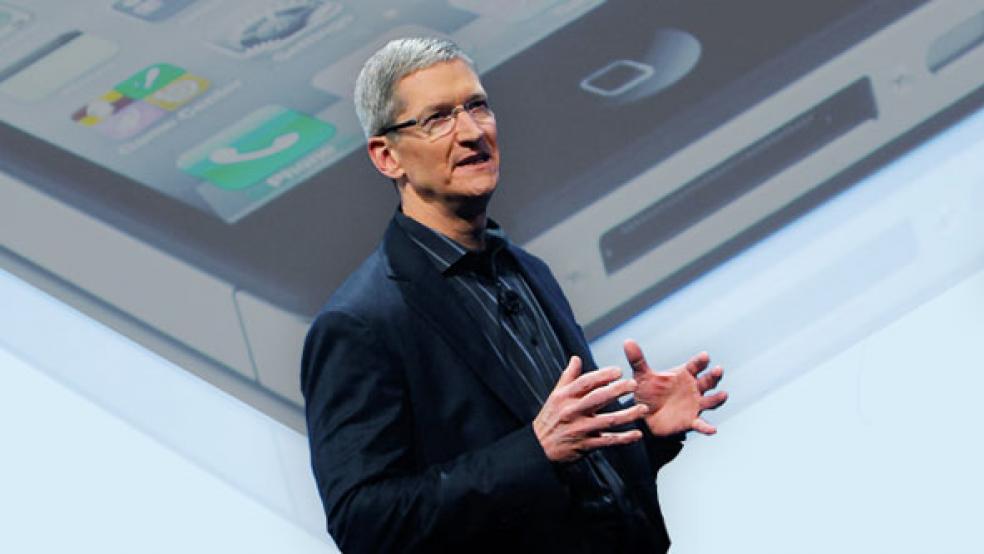Forget about the frustrations of waiting for Godot, as depicted in Samuel Beckett’s famous play. Waiting for Apple CEO Tim Cook to say anything significant to address the numerous questions that weigh on the minds of many investors – and that appear to be weighing heavily on the company’s stock price – may be just as much of an exercise in futility.

As market indexes have crept ever closer to their highest levels since 2007 in recent weeks, Apple’s (NASDAQ: AAPL) share price has largely moved in the opposite direction. The company’s earnings disappointed Wall Street and so far there is no clear indication of what the company will do in order to return to the days of high growth and high margins.
Yesterday morning marked what was widely anticipated to be a significant appearance by Cook at the Goldman Sachs Technology and Internet conference out in California. Policy wonks may have spent the day eagerly anticipating President Obama’s comments at last night’s State of the Union address; for many investors, however, what Tim Cook might have had to say about the State of Apple was even more important.
The problem was that Cook ended up saying remarkably little of significance, and even less that was at all surprising or revelatory. Does it shock anyone to hear that Apple’s “only religion” is to never “make a crappy product” or that its corporate mantra may be “We must do something great”? Was it really all that noteworthy that Cook thinks the display screens on the iPhone’s archrival Samsung Galaxy S III are “awful”? In the unlikely eventuality that he found something worth praising about the Galaxy smartphone, and the still more unlikely scenario in which he uttered that praise aloud during his comments, Cook’s thoughts might have merited headlines. As it was – well, not so much.
Apple “innovates like magic,” Cook reminded his audience. Yes, but – what is coming next? With the smartphone market rapidly maturing (except for emerging countries, where both Apple and its rivals likely will face more price pressure from competitors like Huawei) and margins on the iPad tablets contracting on average thanks to the introduction of the iPad mini, investors were eager for some hints as to what all that innovation magic might lead to in the way of new products. But there wasn’t any of that, either.
In fact, as Estragon and Vladimir discover peering into their hat or their boot in Beckett’s play, there was a lot of nothing. Except, perhaps, frustration on the part of Cook that his investors (and especially hedge fund manager David Einhorn of Greenlight Capital) want Apple to do something. In Einhorn’s case, that is to create a special class of shares that would pay out a whopping great dividend to their owners, addressing the peculiar problem of Apple’s $137 billion cash mountain. Einhorn is even suing the company to prevent a change in policy that he believes would make this more difficult to execute. For his part, Cook simply dismissed Einhorn’s lawsuit and, implicitly, his arguments, as a “silly sideshow.”
Clearly, if some of Apple’s shareholders and investors are frustrated by all the waiting for the company to do something – launch a new product and not just a version five or six of an existing one; announce a big dividend payout; take the first step in a new direction through an acquisition – Cook’s response is irritation and incomprehension.
Maybe that’s because he failed to put on his “listening ears” (as the parents of one kindergartner I know phrase it) before he started talking. Cook made it clear, for instance, that Apple has no plans to launch a cheaper iPhone. That’s fine – but had he been listening, he would have picked up on the uncertainty surrounding the sales of the iPhone 5 and the fact that Apple didn’t break out model-specific sales when it reported its results last month. He would have understood that the questions surrounding a cheaper iPhone stem from multiple research reports suggesting that the smartphone market is more mature and owners less are less willing to upgrade their devices every few months. Just because he sees sales of the iPads and mini iPads, with their lower margins, as an opportunity to convince those buyers to move on and buy other Apple products doesn’t mean that investors will automatically have faith that this will happen, or be enough to drive sales and margins higher across the board.
Apple’s stock drifted lower in the aftermath of Cook’s comments, having risen slightly as he spoke. The reaction isn’t surprising; aside from an offhand confirmation that Apple has contemplated large acquisitions but ultimately not proceeded with any of them (no names mentioned), there wasn’t much here that would challenge an investor’s preconceived opinions.
Resolute bulls will take comfort in Cook’s optimism and confidence; those made anxious by the stock’s fall from grace won’t find much here to revive their enthusiasm. And the status quo remains in place, at a time when what Apple really needed to do was deliver something that would jolt investors into remembering that this is Apple, the innovator par excellence.





